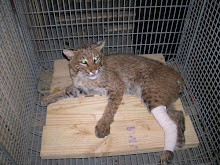After dozens of phone calls from people living in the village of Middleburgh, I have decided to put out this pamphlet in an effort to educate you about skunks and how to peacefully deal with them. Some helpful advice and facts from your local wildlife guy....
WES Laraway
Facts:
- Skunks are territorial solitary creatures unless with young; if you remove one, two will often move in to replace it. Skunks don't look for trouble, it takes a lot to provoke them to spray.
- The only natural predators of skunks are Great Horned Owls (and some coyotes) but cars kill a lot more of them.
- Skunks are opportunistic. If you feed the cats outdoors, bring in the food at night to discourage visits from wildlife. Garden sheds make perfect skunk houses, skunks love living under them. Seal off the area around outdoor buildings so that critters can't get underneath.
- Skunks are nocturnal. Skunks emerge to forage for food in the early evening. Be extra careful around skunks that you see out during the day. There is a very good chance that they are sick.
- Skunks enjoy their privacy. You can often get a skunk to move on to other places by putting a radio and/or light under any porch (or shed) that they are living under. You can usually tell if you have squatters living with you by looking for paths of dirt under porches or backyard sheds. Put some sticks or leaves in the path to see if they are dug out the next morning. Once you are sure that nothing is hiding and/or sleeping under there, seal off the entrances so they can't return or use a one way door. One way doors are great and do not allow animals back into the den once they leave. You can make them or find them for purchase online at places like Tomahawk Live Trap Company. One way doors should not not used in May or June when there could be babies in the den. Skunks release their musk when they die; the smell of trapped dead decomposing babies in the den is even worse. Another trick that works well (and is cheaper) is to place a rag soaked with ammonia in their entrance holes. They don't like the smell (yes, that is ironic).
- Skunks are easily caught in live-traps; the trick to moving them without getting sprayed is to very slowly and quietly cover the trap with an old sheet. Walk towards the trap slowly and cover the trap. Remember that it is illegal to relocate a wild animal in NY State without permission of the property owner that you are releasing the critter on. It is often easier to eliminate food sources and den/living areas to encourage skunks to move on than it is remove them. Remember that there will always be skunks in your yard; living with them is what you need to learn.
- Pick up your trash--skunks love it. Store it in a can with a lid that locks shut. This will discourage bears, raccoons and 'possums as well. Clean up hiding spots around your yard. Skunks also love living in woodpile;, I've found that wood stacked and stored up off the ground is less attractive as a home to skunks.
- "Skunks can only spray once": FALSE. They have two anal glands that can spray 5-6 times (in two different directions) if required to defend themselves. They can be very accurate up to ten feet away. Skunks rarely fire all of their musk, since it takes up to 10 days to completely recharge and that would leave them vulnerable. If your dog or cat gets sprayed, it is usually in the face for being too nosy or scaring a skunk which is minding its own business. The best treatment for getting rid of that smell isn't expensive and isn't tomato or vinegar based. I've found that cheap mouthwash works best. Wet the pet completely, then carefully apply the mouthwash over its entire body. Include the face--but be very careful around the eyes. Let this sit for around 15 minutes, rinse and then repeat. You will still get a faint skunk smell when the dog gets wet again but it works great at eliminating 95% of the smell. The only thing that will get rid of all of the smell is time.
- Skunks will be very active at night this time of year. They know that they will need to sleep for several weeks soon and want to bulk up as much fat as possible before it snows and gets cold. In the spring, usually May, they will emerge with 2-10 babies. The babies stay with the mother until late August when they go off on their own. The average life expectancy of a skunk is three years.
- Skunks are omnivores. They actually prefer the plant and insect pests that destroy our yards if allowed to enjoy their natural diet.
If in doubt, move them out. I am licensed to do Nuisance Wildlife Removal (for a fee) but an ounce of prevention is always worth a pound of cure.
I know that there is an extremely high concentration of skunks in the Village of Middleburgh. I hope that I have given you some ideas for managing the problem. Feel free to call me (518)827-7733 if you have any questions or problems.
Wes Laraway
Director
NY Wildlife Rescue Center







No comments:
Post a Comment